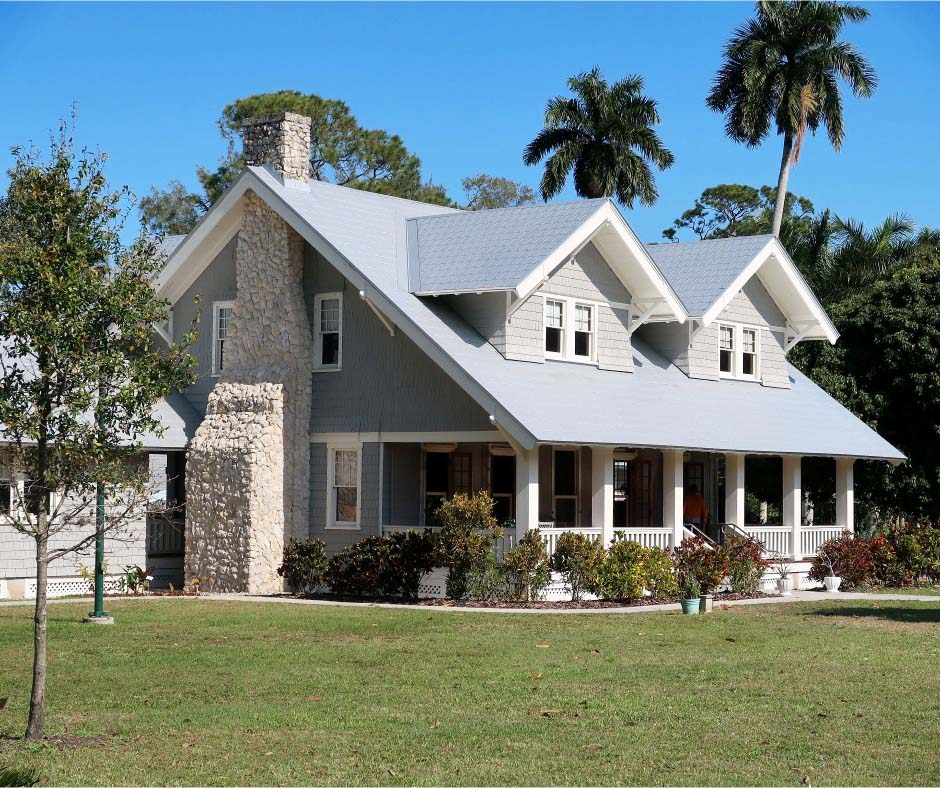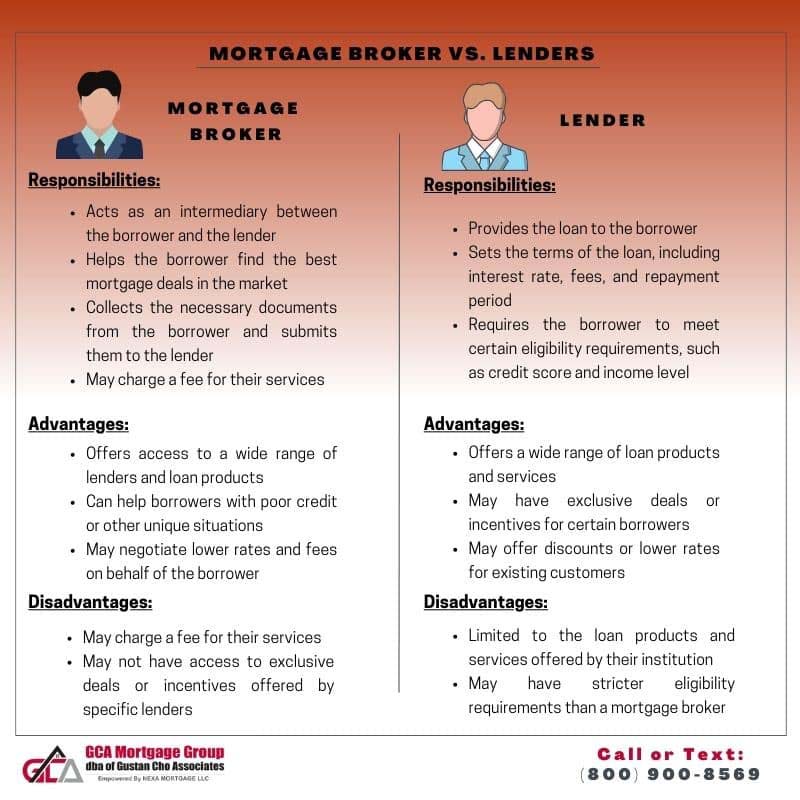Difference Between Mortgage Brokers Versus Lenders
This article will cover the difference between mortgage brokers and lenders. Should I use mortgage brokers versus lenders to get the best rates and terms when buying a house? Dale Elenteny of Gustan Cho Associates suggests the pros and cons of using mortgage brokers versus lenders and will answer the frequently asked question about the difference between mortgage brokers and lenders.
A mortgage is a loan to buy, own, or renovate real estate. Mortgage rates are determined with the lender’s loan level pricing adjustment which are pricing hits due to the borrowers layered risk level. All mortgage loans are secured with the real estate as collateral. With high rising mortgage rates and high home prices, homebuyers need to understand the mortgage process and need to select a lender with the best mortgage rates possible.
Both mortgage brokers and direct mortgage lenders are considered lenders by consumers and realtors because the ultimate result is for both mortgage brokers and mortgage lenders to close loans. They may also have an equal intention of supporting customers in acquiring real estate. However, the nature of their function is unique. This post will cover how a mortgage broker differs from a mortgage banker and a few valuable pieces of information you want to understand about the estate market.
The Role of Mortgage Brokers Versus Lenders
What does a mortgage broker do? A mortgage broker is a third-party licensed home loan consultant with lending relationships with wholesale mortgage lenders. Dale Elenteny used to work as an account representative as a wholesale lender. He describes the role of mortgage brokers versus lenders as follows:
The role of a mortgage broker is to provide the client with a way to advise and choose the best mortgage loan option with the lowest rate and terms for their borrowers.
Mortgage brokers are independent licensed mortgage experts who need lending relationships with wholesale lenders. Mortgage Brokers represent their clients with multiple relationships with wholesale mortgage lenders. Brokers will shop the borrower’s files with multiple lenders to get them the best mortgage loan option at the lowest rate and best terms.
How Do Mortgage Brokers Decide Which Wholesale Lender To Use
The mortgage broker also acts as the intermediary in preparing the paperwork and documentation for the mortgage loan between the borrower and the wholesale lender. The loan officer initially qualifies borrowers regarding credit and income history, credit score, income, and employment, running a credit report and an automated underwriting system. The mortgage broker will contact multiple wholesale account representatives and decide which wholesale lender he or she will submit the borrower’s file. The lender and the borrower.
Mortgage brokers can assist homebuyers buying or refinancing primary homes, second homes, and investment properties. A mortgage broker has access to dozens of wholesale lenders where mortgage lenders can only represent their clients just to their products. Mortgage brokers are licensed professional and can shop multiple wholesale lenders to get the best rate and terms for their borrowers.
Mortgage brokers assist in shopping wholesale lending networks with the best mortgage loan option for their borrowers. Mortgage brokers do research by contacting wholesale lenders who have the best product with the lowest rates and terms. Through their network, research, and experience within the real estate and housing market, mortgage brokers have a lending network of wholesale lenders to shop for their borrowers.
Responsibilities of Mortgage Brokers Versus Lenders
Mortgage brokers have a lot more responsibilities than lenders. Most lenders need to know their mortgage banker’s loan products and guidelines. Dale Elenteny of Gustan Cho Associates explains how mortgage brokers contacted him, and he spent countless hours helping the broker. Still, the broker ended up taking the deal to another wholesale lender. Here is what Dale Elenteny says about how mortgage brokers shop wholesale lenders to get the best deal for their borrowers:
Mortgage brokers shop the borrower’s mortgage loan application to multiple wholesale mortgage lenders to get whether or not the wholesale lender can do the loan and the best rate and term the wholesale lender offers. Wholesale lenders work on commission.
Many wholesale lenders know the time they spend with a loan officer is not a guaranteed deal and that loan officers have no loyalty to them. Loan officers’ loyalty is toward their borrowers. Searching for the best mortgage loan option for each purchaser is demanding. Through a mortgage broker, one could have to get the best mortgage loan option for their borrower with the best rate and terms. The mortgage broker can suggest a loan option that offers the best net tangible benefit for the borrower.
Rates of Mortgage Brokers Versus Lenders
Not all lenders offer the same rate for a specific credit score borrower on the same mortgage program. It is wise to shop for the best rates. Borrowers with lower credit scores often do not shop for rates due to having low self-esteem due to their low credit scores. Every wholesale mortgage lenders and individual mortgage banker have their mortgage rates they offer borrowers based on their credit and credit scores, says:
Borrowers can also price charges from mortgage brokers once they get their loan estimates. Homebuyers should shop for rates without having the lender run credit. Borrowers with bad credit and lower credit scores should shop for rates.
Wholesale lenders who cater to 500 credit score borrowers will have different rates. Most loan officers will shop rates for their borrowers and take the file to the wholesale lender with the best rate and terms. Borrowers with lower credit scores should shop multiple mortgage lenders for bad credit to get the best rates possible.
How Are Rates Priced For Mortgage Brokers Versus Lenders
Mortgage brokers receive a yield spread premium commission for their compensation which is reflected in the rate. The higher the commission, the lower the rate. The maximum yield spread premium a mortgage broker can make is a maximum of 2.75% and needs to be reflected on the closing disclosure. Mortgage lenders can make more with no cap on yield spread premium and do not have to disclose it on the loan estimate.
John Strange of Gustan Cho Associates has worked as a mortgage banker and a mortgage banker. Here is what he says about the difference between mortgage brokers versus lenders.
The borrower and variety pay borrower charges from 1% to 2% of the entire mortgage quantity. They can be brought as a lump sum at closing however are occasionally rolled into the whole mortgage quantity or otherwise included in mortgage charges.
Lender commissions may also vary from 0.50% to 2.75% of the mortgage loan amount. Mortgage brokers get a yield spread premium from wholesale lenders. Mortgage lenders use their funds and add back-end compensation. When mortgage companies charge their compensation on the back end of the transactions, the right-hand rule is the higher the lender makes, the higher the mortgage rates.
What Is a Mortgage Banker Compared To Mortgage Brokers
A mortgage bank is a company that uses its funds to originate and fund home loans using its warehouse line of credit. Mortgage brokers do not have to disclose compensation on the loan estimate or closing disclosures. Mortgage bankers may vary from a few people to large organizations with thousands of workers. Many home mortgage bankers make money from charging premiums above the par rate on the back end of each transaction.
A mortgage banker is mortgage company who originates, process, underwrites, and funds mortgage loans using their own funds using their warehouse line of credit. Mortgage bankers then sell the loans they fund on the secondary market to either a larger mortgage lender or directly to Fannie Mae or Freddie Mac. Fannie Mae and Freddie Mac are the largest purchasers of mortgage loans from lenders.
Mortgage bankers offer mortgage loan options such as rates, fees, and other charges for borrowers. Mortgage bankers may be individuals or organizations that lend for a home mortgage using their funds from their warehouse line of credit. The mortgage approval mortgage bankers can approve will highly depend upon the borrower’s credit score records and financial capability. Mortgage bankers provide unique mortgage options with various rates, loan-level pricing adjustments, and charges based on the borrower’s level of risk.
The Role of Mortgage Lenders Compared To Mortgage Brokers
Mortgage bankers facilitate mortgage originations for the financial group they’re hired through, while agents are independent experts in real estate financing. In phrases of flexibility, mortgage bankers are less flexible, as they’re hired through a financial group and can only offer financing options to the customers that the group underlines. Preferred Mortgage Rates, a discount low-rate mortgage brokerage, explains the difference of mortgage brokers versus lenders as follows:
The difference between mortgage bankers versus lenders is mortgage brokers have a max 2.75% compensation cap which is also referred to as yield spread premium. Direct lenders, mortgage bankers, and correspondent lender have no maximum compensation and do not legally have to disclose their back end compensation. Mortgage brokers disclose their compensation or yield spread premium up to 2.75. The reason Preferred Mortgage Rates has such discount low rates is because we charge a maximum compensation or yield spread premium at 1.50%.
From a borrower’s perspective, the solidity is extra incredible for a mortgage banker, as he’s hired through a famous organization specializing in mortgage loans. The organization will pay the banker an income, so he’ll probably work in the organization’s best interest and the borrower’s. Lastly, in phrases of repayment structure, bankers work on a fixed salary structure alongside any related charges or performance-based bonuses.
Mortgage Broker Versus Lenders
Please check out these points to finalize the difference between a mortgage broker and a mortgage banker. Mortgage brokers and lenders have certified real estate agents offering individual or business clients services. Angie Torres of Gustan Cho Associates said the following:
A mortgage broker is a middleman between creditors and borrowers in the real estate market, while a mortgage banker gives loans to pay mortgages.
Mortgage brokers assist customers in locating first-class offers in the market. Mortgage bankers provide unique mortgage options with various amounts of interest.
Yield Spread Premium Charged By Mortgage Brokers Versus Lenders
The yield spread premium is the commission or back-end compensation lenders charge. Mortgage brokers cannot charge more than a 2.75% premium or commission, and the yield spread premium must be disclosed on the closing disclosure. However, lenders do not have to disclose their compensation. Mike Gracz of Jumbo Mortgage Options, a large discount mortgage broker for the largest selection of jumbo mortgage options with a reputation of having the lowest rates on jumbo loans, made the following statements:
There is no such thing as FREE in the mortgage business. The lower the lender charges, the lower the commission. You will be paying double or triple in commissions by dealing with a mortgage banker versus mortgage broker. There is no way a mortgage banker can survive with a 2.75% yield spread premium like mortgage brokers due to high overhead.
According to Ronda Butts of Preferred Mortgage Rates, mortgage bankers risk their capital to fund loans in loan origination. Also, they’re not required to reveal the fee at which they sell mortgages. The yield spread premium or commission charged by mortgage brokers needs to be disclosed to consumers on the loan estimate under federal and state laws concerning full disclosure. Mortgage lenders do not have to disclose how much they make because they use their funds from their warehouse line of credit.
Frequently Asked Questions (FAQs)
1. What is a mortgage broker?
It’s a licensed professional who acts as a mediator. They work with multiple lenders to find the best mortgage products for their clients based on their financial situation, credit history, and homebuying needs.
2. What is a lender?
A financial entity that offers loans straight to borrowers. Lenders can be banks, credit unions, or mortgage companies that offer various loan products and have their underwriting criteria.
3. How do mortgage brokers and lenders differ in their roles?
Mortgage Brokers: They shop around with multiple lenders to find the best loan terms for the borrower. Brokers don’t fund the loans themselves; they connect borrowers with lenders who do.
Lenders: They fund the loans directly and manage the entire loan procedure from application to closing. Lenders offer a set of loan products and are limited to their terms and rates.
4. What are the advantages of using a mortgage broker?
Access to Multiple Lenders: Brokers can offer various loan options from different lenders.
Personalized Service: Brokers work closely with borrowers to find the best fit for their needs.
Convenience: Brokers handle the paperwork and communication with lenders, making the process smoother for the borrower.
5. What are the disadvantages of using a mortgage broker?
Broker Fees: Brokers may charge fees for their services, which can add to the loan cost.
Potential Conflicts of Interest: Some brokers might steer clients toward lenders that pay higher commissions, which is not necessarily the best deal for the borrower.
6. What are the advantages of using a lender directly?
Direct Control: Lenders have direct control over the loan process and can provide quicker answers and solutions.
Potential Lower Costs: Eliminating the intermediary can reduce the overall cost of the loan.
7. What are the disadvantages of using a lender directly?
Limited Options: Borrowers are restricted to the loan products and terms that particular lender offers.
Less Personalized Service: Lenders may provide a different personalized service than brokers, who have more time to dedicate to individual clients.
8. How do mortgage brokers get paid?
Mortgage brokers earn commissions from lenders for bringing in new business, typically a percentage of the loan amount. They might also impose a fee on the borrower, which could be either a fixed amount or a percentage of the loan.
9. Can using a mortgage broker save me money?
Due to their access to multiple lenders, a mortgage broker can save money by securing a loan with better terms and lower interest. However, it’s important to consider any broker fees.
10. Should I choose a mortgage broker or a lender?
The decision is based on your personal needs and preferences. A mortgage broker might be the best choice if you want access to many loan options and personalized services. If you prefer working directly with the institution to fund your loan and potentially save on fees, going directly to a lender might be more suitable.
11. Are mortgage brokers regulated?
Yes, mortgage brokers are regulated by state and federal agencies to ensure they adhere to ethical standards and practices. They must be licensed and comply with laws.
12. How can I find a reputable mortgage broker or lender?
Research: Check online reviews and ratings.
Referrals: Seek help from friends, family, or your real estate agent for suggestions.
Verify Credentials: Ensure they are licensed and in good standing with regulatory bodies.
13. Can a mortgage broker help with bad credit?
Yes, mortgage brokers can often help borrowers with bad credit by finding lenders who offer subprime loans or other specialized loan products designed for those with less-than-perfect credit.
14. What questions should I ask a mortgage broker or lender?
What loan options are available to me?
What are the interest rates and fees associated with each option?
How long will the loan process take?
Are there any prepayment penalties?
What documentation is required?
15. Do I need to get pre-approved through a broker or lender?
Both mortgage brokers and lenders can provide pre-approval. It’s an important step in the home buying process, showing sellers you are a serious and qualified buyer.








